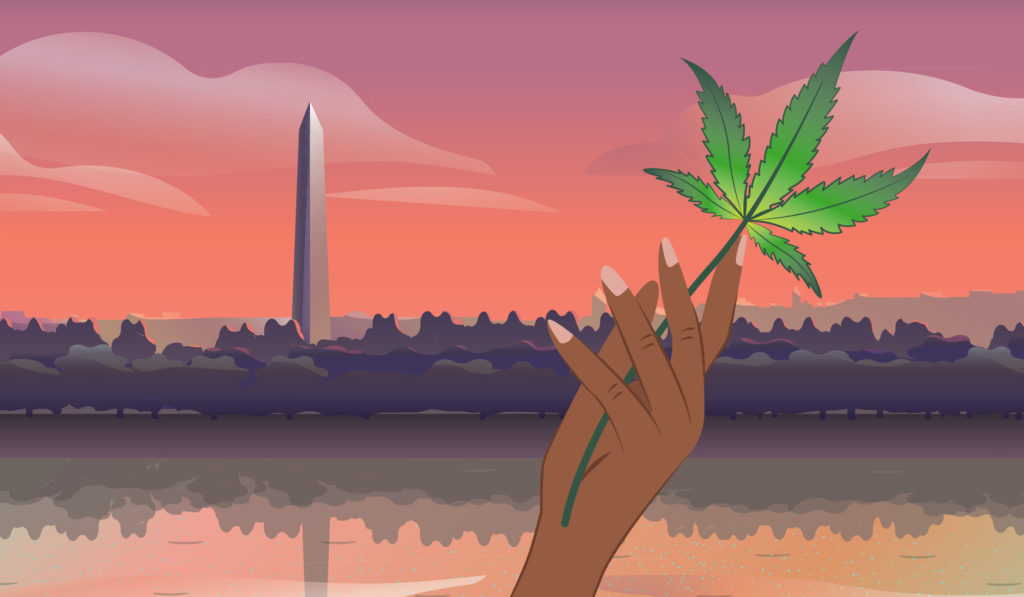Since the D.C. Attorney General gave district lawmakers the green light to work on cannabis regulations for the recreational program passed by residents in 2014, advocates are urging they include reparative measures addressing the historic harm to Black and brown communities caused by racist enforcement of cannabis prohibition.
In a report published by the D.C. Fiscal Policy Institute, author Doni Crawford predicts D.C.’s adult-use (recreational) cannabis program, “if designed well, will be able to create more equity, and in some areas, reparations for the damage past cannabis policy has wrought.”
In the report, cannabis proponents and advocacy organizations crafted a list of policy recommendations that would ensure equal access to the new industry and direct cannabis tax revenue to communities most harshly impacted by cannabis prohibition. The policy recommendations are summarized below and can be viewed in their entirety here.
-
Automatically expunge criminal records for cannabis-related D.C. code offenses, dismiss pending charges and release anyone locally incarcerated for cannabis-related offenses.
-
Establish legal spaces for public cannabis consumption.
-
Ensure equitable access and fair distribution of cannabis dispensaries and cultivation centers in communities.
-
Protect cannabis consumers from employer discrimination.
-
Create an inclusive and independent regulatory body to ensure equitable enforcement of cannabis law and that progress is tracked towards racial justice.
-
Develop a repository licensing program to increase racial diversity and ownership of D.C. cannabis businesses where at least half of cannabis licenses are directed towards program participants.
-
Allow and actively support individuals with criminal records to enter the cannabis industry.
-
Direct cannabis tax revenue to build community wealth in neighborhoods where people were disproportionately targeted and harmed by cannabis prohibition
The report says, “given that structural racism is designed to protect wealth for white people and deny it to Black people and other people of color—combined with the specific economic harm for people of color created by prior cannabis policy—simply opening up this industry without intentionality will exacerbate inequities.”
This is because the upfront costs to start a legal cannabis business are often high and federal restrictions prevent access to small business loans from banks—access which is disproportionately denied to Black and brown people in all industries even without the restrictions of cannabis. When Maryland opened up their medical cannabis industry for license applications, none of the first cultivation, processing or retail businesses were Black-owned, which had to be addressed in remedial legislation later on.
D.C. is restricted by federal law due to its lack of statehood, which allowed a Republican-controlled senate to block D.C.’s legalization of adult-use cannabis in 2014 using a congressional budget rider prohibiting D.C. from using federal funds to regulate cannabis. As of now, cannabis is still federally illegal and the budget rider is still in place, which could change in the near future since Democrats flipped the Senate in January. In 2015, D.C. legalized cannabis possession for adults over the age of 21 which permitted residents to grow, possess and exchange—but not sell—small amounts of cannabis for consumption on private property, a legal maneuver meant to reduce cannabis prosecution without violating the terms of the budget rider.
The D.C. Attorney General’s office recently bypassed this federal interference by permitting lawmakers to begin writing these regulations, likely in anticipation of decriminalization at the federal level.
In 2019, the D.C. city council considered two bills that would legalize cannabis for adult-use in the District (again), one written by Councilman David Grosso and another by the office of Mayor Muriel Bowser. Neither bill included reparative measures meeting the standard recommended by the report, but Mayor Bowser’s bill was especially restrictive by prohibiting individuals charged with felony drug offenses from accessing cannabis licenses.
Prior to legalizing possession, Black people were eight times more likely to be arrested for cannabis possession in D.C. than white people. After legalization, Black people are now 11 times more likely to be arrested for cannabis possession in D.C., indicating that enforcement of cannabis law actually became more racist after legalization. The report also states Black people made up 89 percent of cannabis arrests in D.C. both before and after legalization.
“Criminalization directly harmed many Black and brown families’ ability to be hired for a job, secure housing, receive federal financial aid for higher education and financial assistance to support their family, drive, own a business, vote, etc,” the report concludes. “Now is the time to atone for these historical injustices by ushering in a new cannabis industry rooted in equity.”
Illustration by Kathy Wyche

